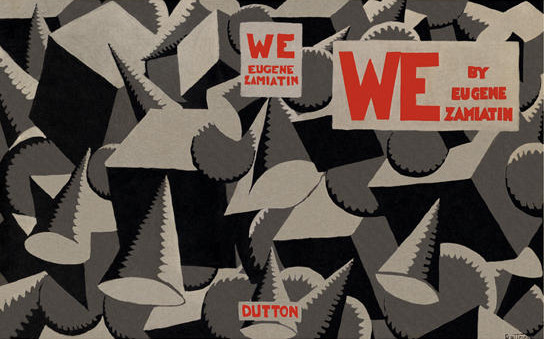Yevgeny Zamyatin: We (1924–) [EN, DE, CZ, FR, ES, YU, SK, RU, CR, TR, GR]
Filed under fiction | Tags: · machine, science fiction, technology

“Shortly after the nascent Soviet government consolidated its power and launched a program of rapid industrialization, Yevgeny Zamyatin’s novel We (written 1920-21) scandalously questioned the validity of techno-scientific instrumentality, a central principle of societal transformation in Soviet Russia. The first major work of fiction to be censored by the new regime, the novel was smuggled to the West, translated into English, and became an ur-text of twentieth-century science fiction, in particular standing, alongside Aldous Huxley’s Brave New World and George Orwell’s 1984, as progenitor of a new anti-utopian subgenre warning of the mass cultural homogenization of humanity in the name of progress. Set in a future totalitarian OneState, the novel records the internal conflict and gradual self-awakening of the initially robotlike rocket engineer D-503, torn between his faith in state orthodoxy and yearning for perfect order, on the one hand, and, on the other, his growing awareness of his own disorderly, irrepressible, idiosyncratic subjectivity. The catalyst of this subversive development is the act of writing—paradoxical insofar as this act functions, in the totalitarian system envisioned by the novel, as one of the instruments of the state’s all-pervasive control. […]
Zamyatin’s anti-utopian novel establishes a counterpoint to the purely instrumental technologies conceived by technophiles and tech-nophobes alike insofar as the author consistently deprives technology of its defining characteristic in Industrial Age culture, namely, its functionality. In its place, We imbues technology with various human traits, transforming machines into great vehicles for reflection. As opposed to the aspirations of Soviet ‘new men’ to become machines, Zamyatin’s text features ‘reflexive technologies’ in which pure instrumentality is marred by human idiosyncrasies. In this effort to aesthetically reassess technological potential, to view technology as a medium for contemplation rather than societal change, Zamyatin’s We takes its place within a canon of artistic works that responded to technological advancement with an urge not to exploit but to explore.” (from an essay by Julia Vaingurt, 2012)
The first unabridged Russian edition was published by Chekhov Publishing House in New York, 1952.
English edition
Translated and with a Foreword by Gregory Zilboorg
Introduction by Peter Rudy
Preface by Marc Slonim
Publisher E. P. Dutton, New York, 1924
Reprint, 1952
SBN 0525470395
218 pages
Wikipedia (EN)
We (English, trans. Gregory Zilboorg, 1924/1952)
Wir (German, trans. Gisela Drohla, 1958, EPUB)
My (Czech, trans. Vlasta and Jaroslav Tafels, 6th ed., 1969/2006)
Nous autres (French, trans. B. Cauvet-Duhamel, 1971)
We (English, trans. Mirra Ginsburg, 1972, 21 MB, no OCR)
Nosotros (Spanish, trans. Juan Benusiglio, 1972, unpag., Archive.org)
Mi (Serbo-Croatian, trans. Mira Lalić, 1978)
My (Slovak, trans. Naďa Szabová, 1990)
We (English, trans. Clarence Brown, 1993, MOBI), Audio book (torrent)
Мы (Russian, 2003, pp 211-368, DJVU)
Mi (Croatian, trans. Rafaela Božić Šejić, 2003)
We (English, 2006, trans. Natasha Randall, forew. Bruce Sterling, EPUB, added on 2019-1-16)
Biz (Turkish, trans. Algan Sezgintüredi, 2009)
Εμείς (Greek, trans. Ειρήνη Κουσκουμβεκάκη, 2011), HTML
Leave a Reply

